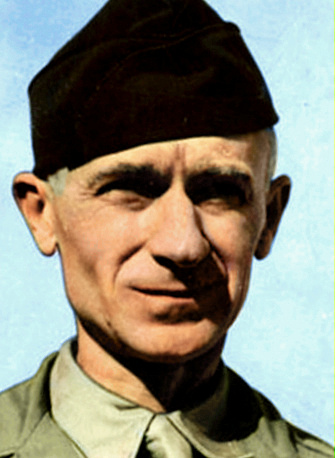
Roving Reporter
By Ernie Pyle
Before he was killed on Ie Shima, Ernie Pyle, as was his habit, had written a number of columns ahead. He did this so there would be no interruptions in the column while he was getting material for more. several more are expected.
OKINAWA (by Navy radio) – One morning after breakfast, about a dozen of us were sitting on the mat covered floor of a little Okinawan house talking things over while sipping our coffee.
Our First Division Marine company had just moved in the night before and several days’ accumulation of grime covered everybody. Suddenly Lt. Bones Carstens stood up and said: “I cleaned my fingernails this morning and it sure does feel good.”
And then my friend Bird Dog Clayton held his own begrimed hands out in front of him, looked at them a long time and said: “If I was to go to dinner in Dallas and lay them things up on a white tablecloth I wonder what would happen?”
A good many of the Okinawan civilians, while Wandering along the roadside, bow low to every American they meet. Whether this is from fear or native courtesy I do not know, but anyhow they do it. And the Americans being Americans usually bow right back.
One of the Marines I know got mixed up in one of these little bowing incidents the other day. He is Pfc. Roy Sellers, a machine gunner from Amelia, Ohio.
Bowing ‘contest’
Roy is married and has a little girl two years old. He used to be a machinist at the Cincinnati Milling Machine Company. He played semi-pro ball too.
When Roy has a beard, he looks just like a tramp in a stage play. He is only 27, but looks much older. In fact, he goes by the nickname of “Old Man.”
Well one day Old Man was trying to ride a Jap bicycle along the bank of a little river where he camped. The ground was rough and the bicycle had only one pedal and Roy was having a struggle to keep his bike upright. Just then an old Okinawan, bareheaded and dressed in a black kimono and carrying a dirty sack, walked through our little camp. He wasn’t supposed to be at large but it was none of our business and we didn’t molest him.
He was bowing to everybody, night and left, as he passed. Then he met Machine Gunner Sellers on his one-pedaled bicycle. Roy was already having his troubles.
As he came abreast of the Okinawan, Roy bowed deeply over the handle bars, hit a rut, lost his balance and over he went. The Okinawan, with Oriental inscrutability, returned the bow and never looked back.
We all laughed our heads off. “Who’s bowing to whom around here?” we asked. Roy denied he had bowed first. But we knew better. After that he decided to give his old bicycle away to somebody less polite than himself.
Reminded of Italy
As our company was moving forward one day and I looked down the line of closely packed Marines I thought for a moment I was back in Italy.
There for sure was Bill Mauldin’s cartoon character of G.I. Joe – the solemn, bearded, dirty, drooping weary old man of the infantry.
This character was Pfc. Urban Vachon of French-Canadian extraction, who comes from Laconia, New Hampshire. He has a brother, William, fighting in Germany.
Urban is such a perfect ringer for Mauldin’s soldier that I asked the regimental photographer to take a picture of him and it has been sent back to the States. Maybe you’ve seen it. If you have, you can prove to any dissenters that soldiers do look like Mauldin makes them look.